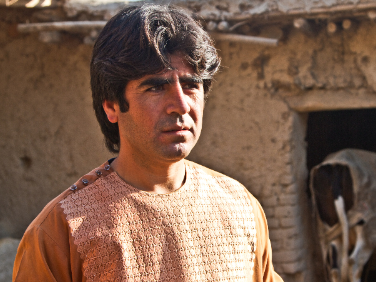
Chanar Gul: from subsistence to success
Give a man a fish and he’ll eat for a day. Give him business training and access to credit and he’ll establish a profitable calf-rearing business with eight partners, more than tripling his income, then use the waste to help offset his fuel expenses. At least, that’s what Chanar Gul did.
“Before (joining Hand in Hand) I was only earning enough to feed my family. Now I can pay for school expenses and even save some money every month,” says the married father of two from Sholgara district, north Afghanistan, not far from the Uzbek border.
Mixed tidings
Chanar’s district is highly populated and ethnically mixed, with substantial Pashtun, Tajik, Uzbek and other communities.
 A newly paved road from Mazar-i-Sharif, the region’s biggest city, connects with a vibrant marketplace in the district centre – a boon to commercial farmers such as Chanar. Still, there are reasons to be concerned. Explosives discovered along the road in recent months have prompted major questions about the area’s security, and earthquakes in the region are common. Floods are too. In spring 2013, heavy rainfall forced thousands of families from their homes, killing dozens and destroying thousands more livelihoods.
A newly paved road from Mazar-i-Sharif, the region’s biggest city, connects with a vibrant marketplace in the district centre – a boon to commercial farmers such as Chanar. Still, there are reasons to be concerned. Explosives discovered along the road in recent months have prompted major questions about the area’s security, and earthquakes in the region are common. Floods are too. In spring 2013, heavy rainfall forced thousands of families from their homes, killing dozens and destroying thousands more livelihoods.
“I am more hopeful for my family’s future”
Sholgara District, Afghanistan
Bullish growth
Cows are big business in Sholgara district, where families treat livestock the way Westerners treat savings accounts: as a source of security. Given his experience working on a neighbour’s farm, Chanar was sure his own business could be commercially viable. But lacking the right skill set to strike out on his own, he was stuck earning a subsistence wage of 2,000 Afghanis (US $36) a month – far from enough to cover his growing family’s expenses. Anxious to improve his situation, the 27-year-old joined a Hand in Hand Self-Help Group to receive business training and learn about peer-to-peer lending.
 Just a few months later, after establishing a strong sense of mutual trust, Chanar and eight group members went into business. Armed with a small loan and help from a vocational mentor with livestock management, animal health and more – both supplied by Hand in Hand Afghanistan – the group achieved total self-sufficiency in only two months. They’re also well on their way to paying off their loan, thanks in no small part to the money they’ve saved using cow dung as a cheap, energy efficient and sustainable source of fuel.
Just a few months later, after establishing a strong sense of mutual trust, Chanar and eight group members went into business. Armed with a small loan and help from a vocational mentor with livestock management, animal health and more – both supplied by Hand in Hand Afghanistan – the group achieved total self-sufficiency in only two months. They’re also well on their way to paying off their loan, thanks in no small part to the money they’ve saved using cow dung as a cheap, energy efficient and sustainable source of fuel.
“Now I earn 6,000 AFN (US $108) a month and I’m more hopeful for my family’s future,” says Chanar.
Chanar’s results
Monthly income of 6,000 AFN (US $108)
300% increase over previous income
More hope for his children’s future
Next case study: Reaping what she sews: Odette Mukarusagara
